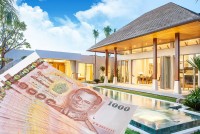- 23.11.2020
Thailand. For many, it is associated with the warm sea, year-round recreation under palm trees. Residents of the country and foreigners have recently been actively buying villas and condominiums on the coast for living or renting out. This was facilitated by the state policy in the field of taxation.
Back in 1932, a law was passed according to which taxes were paid only by land owners. The amount was minimal, it was not even taken into account when selling buildings built on this territory. Those who received income from renting out buildings and structures of various types and purposes also had to share with the budget. What exactly was transferred to the landlord for temporary use did not matter.
Certain payments must be transferred to the budget when purchasing a property. But these fees are one-time. On a permanent basis, the owners of apartments or commercial buildings did not pay taxes.
2019 - time for changes
The situation with real estate taxation changed in January 2019. The Land and Building Tax Act BE 2562 has been prepared at the government level. It provides that individuals and legal entities that own buildings, structures, and land plots, starting in 2020, are required to pay taxes based on the cadastral value of the objects.
The law is valid from 13.03.2019. Tax collection will start in 2020. The government expects to replenish the budget in this way. Immediately it should be emphasized that the law applies not only to those who live in Thailand permanently, but also to foreigners. Do you want to buy an apartment or villa in Phuket for a summer vacation? You should be prepared for additional expenses in the form of real estate tax.
Taxes and fees paid on the purchase of a house or condo after the entry into force of the Land and Building Tax Act BE 2562 are retained. There are no plans to cancel them.
Important nuances of the new Land and Building Tax Act BE 2562
The law comes into force on 01.01.2020. The billing period is 1 calendar year. The accrued amount must be paid no later than April 30 of the year following the reporting year. If the tax is calculated for the year 2020 (data is taken as of 01.01.2021), you must pay the budget before 01.05.2021.
Who will calculate the cadastral value of objects? This responsibility is assigned to local authorities. They will determine the tax base and notify owners of the amount to be paid.
Here it is important to recall one point. You can buy an object both more expensive and cheaper than the cadastral value. The authorities will take into account a large amount. Is the item rated higher than what was paid for it in practice? The tax will be calculated based on the cadastral value. If the contract with the former owner specifies an amount exceeding the cadastral value, the tax will be calculated from it.
Tax rate
Now we go to the point that interests all property owners in Thailand. How much will you have to pay? It should be emphasized here that the law specifies only the maximum rates. Real ones are planned to be installed every year.
The maximum rates depend on the category of the object:
- Land and buildings, buildings intended for agricultural work — 0.15%.
- Residential buildings, cottages, villas — 0.3%.
- Other objects (this group includes all commercial buildings, non-residential) - 1.2%
- Objects that are not used by the owner in any way - 1.2%. If the building is idle, the tax rate will be raised by 0.3% in 3 years. The increase will occur at intervals of 3 years until the maximum is reached (3%).
The Government has decided that in 2020-2021, the tax will be levied at minimum rates. Some categories of payers will be exempt from payments altogether.
Anyone who owns real estate in Thailand will benefit from the information provided in the table below:
Destination | Object | Whom and when it is possible not to pay tax | Cost, million baht | Tax rate |
Agricultural objects | Land plot/buildings | Individual and legal entity. | less than 75 | 0,01% |
76-100 | 0,03% | |||
101-500 | 0,05% | |||
501-1000 | 0,07% | |||
over 1000 | 0,10% | |||
Residential buildings, | Land and buildings on it | Individual designated in the house book. | less than 25 | 0,03 |
26-50 | 0,05% | |||
over 50 | 0,10% | |||
Building | individual Building designated in the house book. | less than 40 | 0,02% | |
41-65 | 0,03% | |||
66-90 | 0,05% | |||
over 90 | 0,10% | |||
Land and / or buildings | — | less than 50 | 0,02% | |
51-75 | 0,03% | |||
75-100 | 0,05% | |||
over 100 | 0,10% | |||
Other purpose | Land plots and / or buildings | — | less than 50 | 0,30% |
51-200 | 0,40% | |||
201-1000 | 0,50% | |||
1000-5000 | 0,60% | |||
over 5000 | 0,70% | |||
Idle objects | Land plot and / or building | — | less than 50 | 0,30% |
51-200 | 0,40% | |||
201-1000 | 0,50% | |||
1000-5000 | 0,60% | |||
over 5000 | 0,70% |
Several conclusions based on the data from the table. A careful study of the data allows you to draw the following conclusions:
Legal entities that own residential real estate (apartments, apartments, villas) will not receive tax preferences.
In some cases, owners are entitled to benefits. If the land plot is intended for agricultural work, its value is less than 50 million baht, the owner will not pay taxes at all. This rule also applies to residential buildings with land plots (up to 50 million baht), condominiums (up to 10 million baht).
If an individual owns an apartment or a villa, then in order to receive tax benefits, this object must be the main place of residence of the owner. In other cases, tax benefits are not allowed.
If a plot or building costs more than the non-taxable maximum specified in the table, the budget will have to pay tax on the difference between the cadastral (contractual) value and the designated threshold for each category.
If a certain individual owns ten houses, you can only get a benefit for the one in which you are registered. All other buildings, apartments, and villas will be taxed.
There is another important point to keep in mind. The object can be "residential" or "other purpose". This applies even to apartments and villas. The amount of tax will depend on how the item is marked. If you purchased a villa for investment purposes and are going to receive income from renting it out, you will have to pay tax in the category of "object of other purpose".
What do foreigners need to know about the Land and Building Tax Act BE 2562?
Earlier in this article, it was already mentioned that foreigners who own real estate in Thailand will also be required to pay tax. And there may be questions. Many people are interested in what is meant by "main place of residence".
We will explain in detail. Anyone who buys an apartment, Villa, condo along with other documents received at the hands of the house register or “tabienbaan”. It is blue as standard.
They give the house book to everyone, but not everyone can be written off in it. Mandatory conditions:
- a citizen of Thailand;
- permanent residence in a specific house or condo.
If the data from the house register shows that someone lives in an apartment or other object on 01.01.2020, this person can legally reduce the amount of tax. Since a foreigner will not be included in the" blue book", it is not necessary to count on tax preferences.
But don't get upset right away. Residents of other countries have the opportunity to reduce costs. To do this, you need to have a long-term non-immigration visa. If it is available, you can contact local authorities and request a "yellow" analog of the house book. If there is no visa, the tax will be calculated to the maximum. There are no benefits in this situation.
In any case, the property tax in Thailand is many times less than in other countries and even much less payments for the maintenance of the common territory that property owners have always paid.
What exactly shouldn't property owners do in Thailand?
Wealthy foreigners spend hundreds of millions of baht to buy houses and villas in a country that attracts tourists from all over the world. Someone is limited to one object, someone buys a condo on the coast for subsequent rental and income. In the latter case, you should not even try to register all the houses as "residential" to receive tax benefits. Let's explain why.
Each city has an immigration police unit. After signing the contract with the property owner, the tenant must visit the nearest subdivision and submit an application for registration. It indicates where they live and who owns the object. In practice, this means that local authorities always know which house is really "residential" and which belongs to "other objects".
You should not even try to rent out houses without a contract and paying taxes. Neighbors will notify the police that there are strangers on the site. The management company will do the same. As a result, the "savings" on taxes turns out to be a penalties in other trouble. Rates under the Land and Building Tax Act BE 2562 are not so high that they fall into the lists of unreliable foreigners.
If you do not plan to live in Thailand permanently, prefer to come for 5-6 months, you can rent a villa or apartment by signing a lease agreement (leasehold). And here you need to remember that the owner can shift the payment of tax to the tenant. It is necessary to find out before signing the contract, so that later you will not face claims from the authorities.









